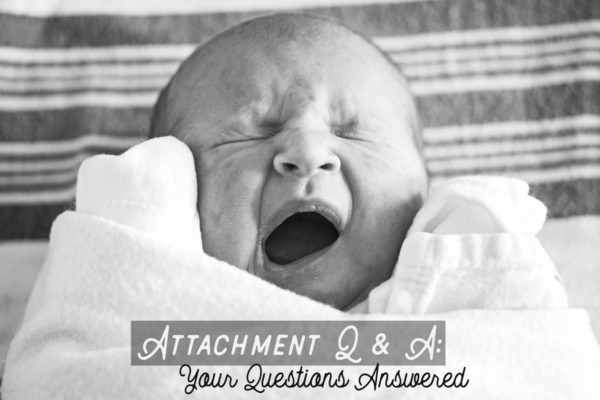Attachment. Not much more could not be packed into one single word, especially in the adoption world.
We spent all of July focusing on this most-important topic and decided to continue into August – but with a bit of a twist.
This month, we’re answering your attachment questions. Because we all have them – we just don’t always have a safe place to ask.

Question:
My 11 year old daughter from China, home since she was 3, still walks around the house as if she’s an uncomfortable guest. It’s as if she has no personal awareness. How do you attach to a child who feels unattached to themselves?
Many children are able to adjust into their new family and life within a year or two, but for some children it takes a lot longer. Some kids have past trauma that gets in the way of a smooth transition into their new family. There may be triggers in their new environment that cause them to revert into past behaviors in order to cope with the current situation.
If you can understand what is going on with her and the reasons she acts the way she does, you may be able to better connect with her.
It also sounds like you might suspect there is more going on with your daughter.
Here are questions that you can ask yourself:
1. Is school challenging? Is she working below grade level? Are there possible cognitive issues?
You might want to pursue a neuro-psych evaluation. This can be done in the schools, at a local therapist office or at a children’s hospital. Ask your pediatrician for a referral.
2. Does she sometimes give you the “deer in the headlights” look? Does she shut down and is she unable to answer your questions?
She could suffer from PTSD (Post Traumatic Stress Disorder).
3. Does she do things with out thinking? Such as run across the street without looking both ways? Grab things quickly or enter into others personal space?
She may lack executive functioning skills.
4. Is she maturing and possibly going through puberty?
Maybe hormonal changes are responsible for some of her unpredictable or moody behavior.
5. Is she always moving and unable to settle down? Does she have a short attention span?
She could have ADD or ADHD.
6. Do you find you have to repeat instructions to her? If you give her a three-step project is she able to follow it or can she do only one or two steps?
There might be an auditory processing issue.
7. Does she talk about her feelings and can she label them? Does she react appropriately to happy (getting a gift) or sad (a family pet passing away) events? Is she able to make friends and keep them? How does she get along with other family members? Does she connect with you or avoid you?
If she is unable to bond to her family and friends she may have attachment issues that can be dealt with through an Attachment Therapist.
8. Is she hypervigilant and always watching you and her environment? Does she sometimes lie, cheat or steal things? Does she treat others kindly and respectfully or does it seem like she uses others to get what she wants? Does she exhibit symptoms of RAD (Reactive Attachment Disorder)?
RAD is a more serious and involved attachment issue. Even though she came home at a young age, she could have RAD. Read about RAD and see if she has any of the characteristics they describe.
Begin to document the behavior you are seeing. Don’t second guess yourself, if you think you see a certain behavior, write it down, even if no one else is seeing this behavior. You have good start with her roaming the house, lack of personal awareness and lack of connection.
Connected Parenting may also be helpful in parenting your child. It’s a parenting technique developed by Karen Purvis. There is a book and DVDs to purchase, and seminars to attend throughout the USA. There is also a general Connected Parenting support group, and one that is China-specific on Facebook. This method of parenting kids from hard places has been very successful!
You may want to find a special needs adoption support group on Facebook or in your community. It is so helpful to be around others that are experiencing the same thing!
After eight years together you have probably tried to “fix” things – but it hasn’t worked. It might be time to seek professional help.
Consider going to a therapist that specializes in adoption and that understands RAD. It is very important to have a therapist that is experienced in both areas. If there is not an experienced therapist near you, call an attachment center and ask for recommendations.
The therapist for your daughter may be helpful for both of you or you may want your own therapist. You will find great support, parenting ideas and hopefully your daughter will experience some healing from her past trauma.

If you can better understand what is going on with her and the reasons she acts the way she does, you may find it easier to connect with her.
My thoughts and ideas for you come from my own experiences. I could have written what you wrote. In fact, I did, but it was nine pages of what we are seeing in our own home and it went to our therapist that specializes in adoption and RAD.
It is very hard to live with these behaviors day after day but we are finding hope in therapy. It is comforting to know we are doing all that we can do to help our daughter.
Feel free to contact me privately for ideas and support. I’ll direct you towards what has helped us.
Blessings on your journey with your daughter!


























I believe that sometimes a family is not a good fit for a particular child. It may be for a variety of reasons… religion, school, siblings, personalities, strict or lenient parents, uncommon interests. That doesn’t mean that she would not be successful in a different family or environment.
https://youtu.be/FWScSJKjn1A
I thought it would be worth mentioning that the TBRI model is another great attachment resource; lots of videos available. Tapestry’s Empowered to Connect podcast is also great.
What if the child (13 years old) refuses to go to therapy and won’t admit there is a problem? Our son has alternately charmed or frozen out every therapist we’ve tried over the years.